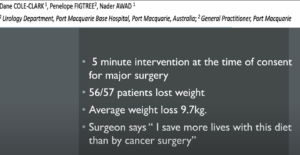Incentivizing Dietary Changes… Ahead of the Knife
Dr. Penny Figtree, decided “After 20 years in general practice [to] focus on weight loss and diabetes.” In Dr. Figtree’s compelling Low Carb Down Under video (Dr. Penny Figtree – ‘The Life of a Low Carb GP’) she tells her story of following official medical guidelines for years, advising patients to “eat less and exercise more,” but because changes in lifestyle never seemed to happen, how she ended up prescribing steadily more medications.
Then Dr. Figtree learned of the success that other doctors were having from advising their patients to reduce carbohydrates:
This decision was made after seeing the power of a low carbohydrate diet to help people lose weight and for some to even reverse diabetes. A very low carbohydrate or ketogenic diet allows you to lose weight without hunger. Most type 2 diabetics can reduce their medications and even stop insulin using this approach. A doctor is needed to monitor this diet as it is powerful and many medications must be stopped, even blood pressure medication. This diet is safe and incredibly effective with over 30 clinical trials showing its effectiveness superior to low fat diet and confirming its safety.
https://www.lowcarbpmq.com.au/
At 7:25 in her “Life of a Low Carb GP” presentation, Dr. Figtree discusses her husband’s low-carb experience with his patients. Dr. Figtree’s husband is a urologist and now, after his obese patients sign permission forms for their surgery, he gives them a five-minute overview of a Diet Doctor Visual Guide on losing weight by cutting carbohydrates. So far 56 of 57 patients lost weight before surgery, dropping an average of 21 lbs. (9.7 kg). At right is overhead from the video, with reference to published study.
Significant weight tends to reduce surgery time, and outcomes are better “with less complications for the patients.” Dr. Figtree’s husband also comments: “I’ve saved more lives with this diet than any operation.”
Though not mentioned in the video, other low-carb doctors and researchers have argued that this dietary advice could reduce covid severity and death. If only people were told (by doctors or public health officials) how quickly they could improve their metabolic health and reduce their risk of severe covid just by shifting what they eat–not by staving themselves, or even going hungry! –but by shifting their diet to more protein and healthy fats and less bread pasta, grains, fruits, sugar, and other carbohydrates.
Recent studies showed that comorbidities such as diabetes, hypertension and obesity contribute to severe and worse outcomes of coronavirus disease 2019 (COVID-19), suggesting that metabolic syndrome and its components are associated with severity of COVID-19.
Metabolic Syndrome and COVID-19 (November 2, 2020)
See also: Could the keto diet help prevent or mitigate severe COVID-19? (November 30, 2020):
There is much evidence that obesity, hypertension and cardiovascular disease contribute significantly to adverse outcomes following coronavirus disease 2019 (COVID-19). It is rational to apply the principles of primary prevention in the attempt to contain this pandemic, by mitigating these risk factors. A new study published in the journal of Translational Medicine reports that the ketogenic diet (KD) may be useful in this area, with its track history of effectual reduction of fat mass, anti-inflammatory and immunomodulatory effects, and consequent improvement of cardiovascular health.
Many earlier posts on nutrition and pubic health have discussed the higher risk American’s with chronic conditions face with the ongoing pandemic.

